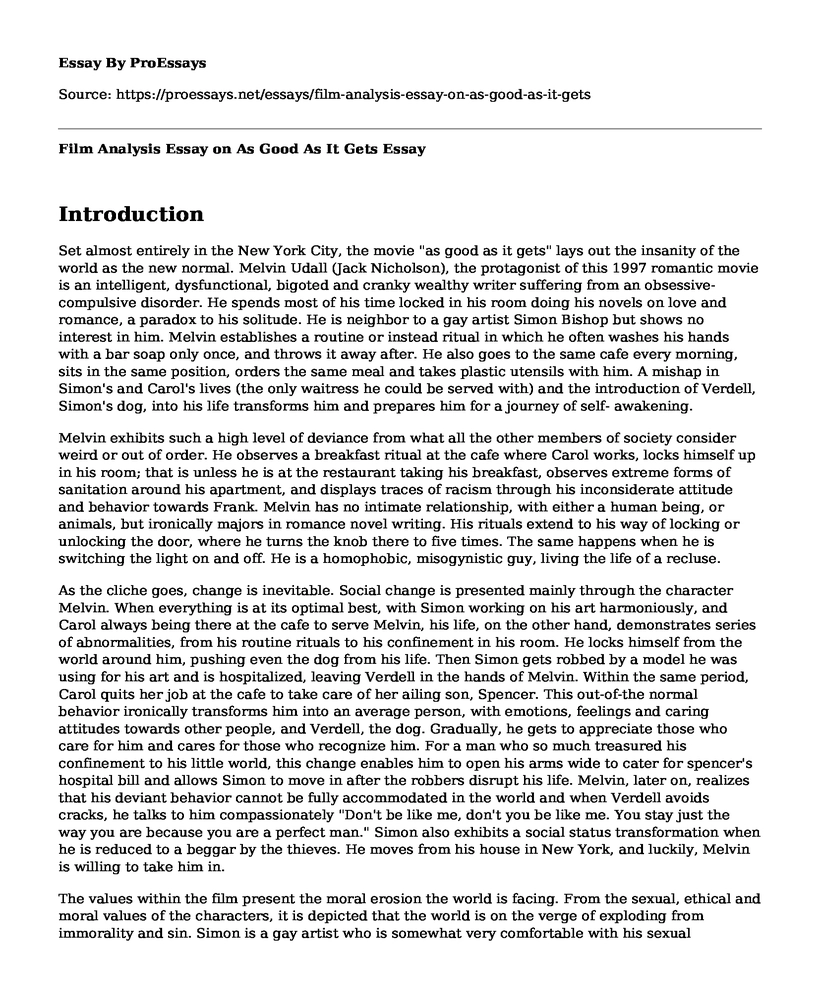Introduction
Set almost entirely in the New York City, the movie "as good as it gets" lays out the insanity of the world as the new normal. Melvin Udall (Jack Nicholson), the protagonist of this 1997 romantic movie is an intelligent, dysfunctional, bigoted and cranky wealthy writer suffering from an obsessive-compulsive disorder. He spends most of his time locked in his room doing his novels on love and romance, a paradox to his solitude. He is neighbor to a gay artist Simon Bishop but shows no interest in him. Melvin establishes a routine or instead ritual in which he often washes his hands with a bar soap only once, and throws it away after. He also goes to the same cafe every morning, sits in the same position, orders the same meal and takes plastic utensils with him. A mishap in Simon's and Carol's lives (the only waitress he could be served with) and the introduction of Verdell, Simon's dog, into his life transforms him and prepares him for a journey of self- awakening.
Melvin exhibits such a high level of deviance from what all the other members of society consider weird or out of order. He observes a breakfast ritual at the cafe where Carol works, locks himself up in his room; that is unless he is at the restaurant taking his breakfast, observes extreme forms of sanitation around his apartment, and displays traces of racism through his inconsiderate attitude and behavior towards Frank. Melvin has no intimate relationship, with either a human being, or animals, but ironically majors in romance novel writing. His rituals extend to his way of locking or unlocking the door, where he turns the knob there to five times. The same happens when he is switching the light on and off. He is a homophobic, misogynistic guy, living the life of a recluse.
As the cliche goes, change is inevitable. Social change is presented mainly through the character Melvin. When everything is at its optimal best, with Simon working on his art harmoniously, and Carol always being there at the cafe to serve Melvin, his life, on the other hand, demonstrates series of abnormalities, from his routine rituals to his confinement in his room. He locks himself from the world around him, pushing even the dog from his life. Then Simon gets robbed by a model he was using for his art and is hospitalized, leaving Verdell in the hands of Melvin. Within the same period, Carol quits her job at the cafe to take care of her ailing son, Spencer. This out-of-the normal behavior ironically transforms him into an average person, with emotions, feelings and caring attitudes towards other people, and Verdell, the dog. Gradually, he gets to appreciate those who care for him and cares for those who recognize him. For a man who so much treasured his confinement to his little world, this change enables him to open his arms wide to cater for spencer's hospital bill and allows Simon to move in after the robbers disrupt his life. Melvin, later on, realizes that his deviant behavior cannot be fully accommodated in the world and when Verdell avoids cracks, he talks to him compassionately "Don't be like me, don't you be like me. You stay just the way you are because you are a perfect man." Simon also exhibits a social status transformation when he is reduced to a beggar by the thieves. He moves from his house in New York, and luckily, Melvin is willing to take him in.
The values within the film present the moral erosion the world is facing. From the sexual, ethical and moral values of the characters, it is depicted that the world is on the verge of exploding from immorality and sin. Simon is a gay artist who is somewhat very comfortable with his sexual orientation. The society as a whole seems as okay as he is, that the model he employs to make his artistic paintings attempts to strip naked for the art, a trait that Simon doesn't wash wish. Sex is presented as a commodity so accessible to the affluent, and this can be seen through Melvin's response to Carol, claiming that he accepted to be her date, so that she could sleep with Simon. Carol doesn't seem to mind stripping nude and availing all her bodily details to Simon for a painting. It also presents society with limited ethics as the man he entrusted as an employee was a robber, who stole from him and left him to die after thoroughly beating him.
Conclusion
With change part of the society, the values, social status, and personalities of every individual are bound to bend to such waves of change. The film presents deviance as a form of indifference and a shield through which many individuals hide within to prevent themselves from the harsh reality the world is. Social values are continually diminishing through the eyes and mind of society, leaving many individuals exposed to the immorality that is the new morals.
Works Cited
As good as it gets. James L. Brooks. Gracie films. 1997.
Cite this page
Film Analysis Essay on As Good As It Gets. (2022, Jul 18). Retrieved from https://proessays.net/essays/film-analysis-essay-on-as-good-as-it-gets
If you are the original author of this essay and no longer wish to have it published on the ProEssays website, please click below to request its removal:
- Essay Sample on Horror Movies
- Films Analysis Essay on Big Eyes and Pollock
- Plan of Action Towards the Company Social Media Failure
- Music Psychology Essay Example
- All My Sons by Arthur Miller Essay Example
- Afterlife: Choose One Memory to Take with You for Eternity - Essay Sample
- Report Sample on Mass Communication on Marginalized Groups







